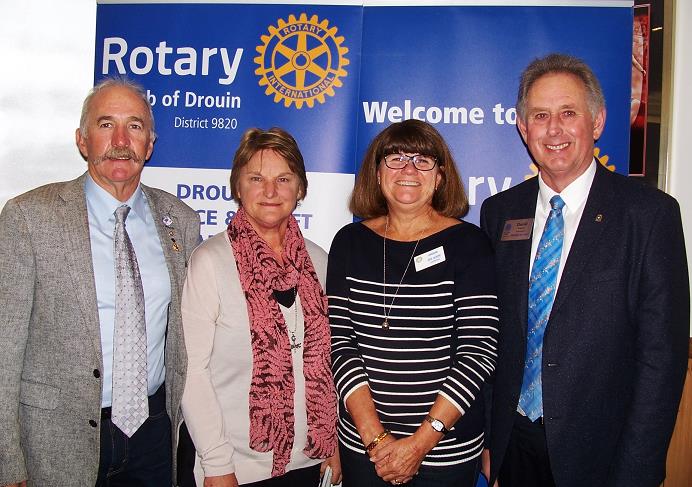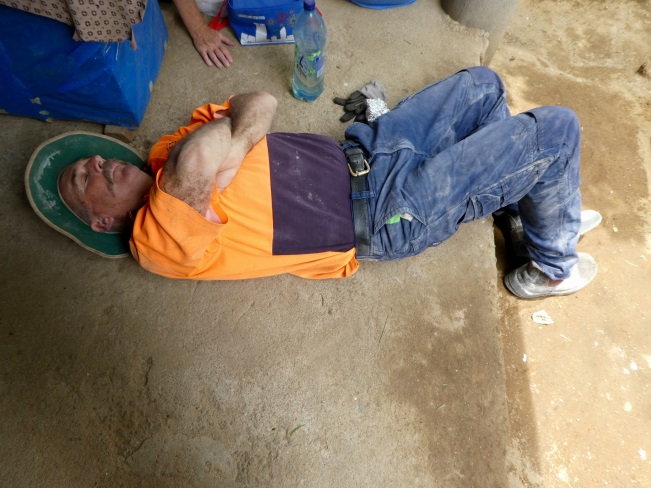
At the last meeting of the Club, our guest speaker was Marion Kee who along with our own Jo and Jeff Copping had worked as volunteers in the Central American country of Guatemala, with the charity organisation Constru Casa which roughly translated by this non Spanish speaking editor means building houses. This is exactly what this charity does for those in need amongst the poorest of the poor in Guatemala.
Volunteering in Guatemala with Constru Casa
Constru Casa is a non-profit organisation offering basic housing to families living in extreme poverty. For 13 years, Constru Casa located in Antigua, Guatemala, a beautiful world heritage site, has constructed over 1000 houses and over 25 schools throughout Guatemala.
Constru Casa aims to make a difference in changing the lives of poor Guatemalan families by offering them the opportunity of affordable and safe housing.
Some families assist in the building of their new homes and are expected to pay back 1/3 of the cost over a 4 year period.
The manner in which these 3 intrepid travelling volunteers got to Guatemala is equally interesting. Jo and Marion were actually in Myanmar on a trip when they met an Australian woman, Simone Kenny from Eltham College in Victoria. She escorts groups of students who undertake volunteer work in that country. The resultant discussion centred on why were there no programs for volunteers to do such work and as a consequence, some time later the two travellers were contacted and asked if they wanted to go to Guatemala, Jeff was invited (co-opted) to tag along.
Guatemala is home to volcanoes, rainforests and ancient Mayan sites. The territory of modern Guatemala once formed the core of the Maya Civilization which extended across the Mesoamericas.
Most of the country was conquered by the Spanish in the 16th Century. Guatemala attained independence in 1821 as part of the Federal Republic of Central America which was dissolved in 1841.
From the mid to late 19th Century, Guatemala experienced chronic instability and civil strife. Beginning in the early 20th century, it was ruled by a series of dictators backed by the United Fruit Company and the United States government. In 1944, a pro-democratic military coup, initiated a decade long revolution that led to sweeping social and economic reforms. A USA backed military coup in 1954 ended the revolution and installed a dictatorship.
Most of the country was conquered by the Spanish in the 16th Century. Guatemala attained independence in 1821 as part of the Federal Republic of Central America which was dissolved in 1841.
From the mid to late 19th Century, Guatemala experienced chronic instability and civil strife. Beginning in the early 20th century, it was ruled by a series of dictators backed by the United Fruit Company and the United States government. In 1944, a pro-democratic military coup, initiated a decade long revolution that led to sweeping social and economic reforms. A USA backed military coup in 1954 ended the revolution and installed a dictatorship.
From 1960 to 1996, Guatemala endured a bloody civil war fought between the US-backed government and the leftist rebels, including genocidal massacres of the Maya population perpetrated by the military.
Since a United Nations negotiated peace accord, Guatemala has witnessed both economic growth and successful democratic elections.
Since a United Nations negotiated peace accord, Guatemala has witnessed both economic growth and successful democratic elections.
However Guatemala continues to struggle with high rates of poverty, crime, drug trade and instability.
Coffee, sugar, and bananas are the main products produced in the country and are significant export income earners.
The distribution of income remains highly unequal with 12% of the population living below the international poverty line.
- The capital is Guatemala City.
- The population is now around 17 million people.
- The land size is 108,000 sq. kms. this is a little less than half the size of Victoria.
- The capital is Guatemala City.
- The population is now around 17 million people.
- The land size is 108,000 sq. kms. this is a little less than half the size of Victoria.
The people are called Ladino in Guatemala. 60 percent of Guatemala's population is of mixed Amerindian-Spanish descent. The remaining 40% of the population is indigenous and consist of 23 Maya ethnic groups and one non-Maya ethnic group. Guatemala has the largest indigenous population in Latin America.
Apart from obviously paying their own way and working as labourers on the construction site, Marion, Jo and Jeff needed to make a donation of $500 Australian to go directly towards the cost of building materials and the wages of local workers, who obviously also benefit from the scheme through employment, as well as the recipients of the houses.
The local party of three were teamed up with a further 13 people, 12 Australians and 1 French woman, which made a total of $16,000 enabling 2 houses to be built in an extended family compound, that housed 20 people in make shift accommodation.
The team of 16 managed to construct two houses in 9 days in the village amongst the hills overlooking Antigua, which is the city that the volunteer teams stayed in.
Conditions were difficult with very few amenities, all labour was done without power so digging, mixing cement, sawing and any other tasks were all done manually in heat and humidity that was very high.
In summing up Marion commented on what wonderful people the locals are, their work and appreciation new no bounds.
Jo felt the same way, she said that at the handing over of the houses she became quite emotional, something that surprised her as she expected to feel satisfied and happy at the contribution they had made, however the joy and overwhelming sentiment displayed by those receiving the houses took her by surprise.
Jeff was also taken by the warmth and generosity of the locals, he also was impressed by the other members of the volunteer team, many who were academics and people who had no previous experience in construction, but who never the less worked diligently in very difficult conditions.

Jeff learns the Spanish word “Siesta”
In thanking all three President David noted how close to Rotary objectives the work done by Marion, Jo and Jeff was. Their passion and contribution to the community in which they worked was commendable.